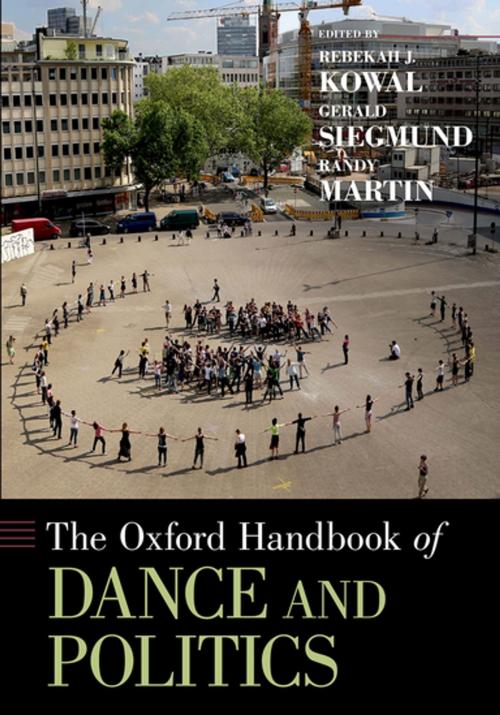The Oxford Handbook of Dance and Politics
Nonfiction, Entertainment, Performing Arts, Dance, Popular| Author: | ISBN: | 9780190654733 | |
| Publisher: | Oxford University Press | Publication: | January 3, 2017 |
| Imprint: | Oxford University Press | Language: | English |
| Author: | |
| ISBN: | 9780190654733 |
| Publisher: | Oxford University Press |
| Publication: | January 3, 2017 |
| Imprint: | Oxford University Press |
| Language: | English |
In recent decades, dance has become a vehicle for querying assumptions about what it means to be embodied, in turn illuminating intersections among the political, the social, the aesthetical, and the phenomenological. The Oxford Handbook of Dance and Politics edited by internationally lauded scholars Rebekah Kowal, Gerald Siegmund, and the late Randy Martin presents a compendium of newly-commissioned chapters that address the interdisciplinary and global scope of dance theory - its political philosophy, social movements, and approaches to bodily difference such as disability, postcolonial, and critical race and queer studies. In six sections 30 of the most prestigious dance scholars in the US and Europe track the political economy of dance and analyze the political dimensions of choreography, of writing history, and of embodied phenomena in general. Employing years of intimate knowledge of dance and its cultural phenomenology, scholars urge readers to re-think dominant cultural codes, their usages, and the meaning they produce and theorize ways dance may help to re-signify and to re-negotiate established cultural practices and their inherent power relations. This handbook poses ever-present questions about dance politics-which aspects or effects of a dance can be considered political? What possibilities and understandings of politics are disclosed through dance? How does a particular dance articulate or undermine forces of authority? How might dance relate to emancipation or bondage of the body? Where and how can dance articulate social movements, represent or challenge political institutions, or offer insight into habits of labor and leisure? The handbook opens its critical terms in two directions. First, it offers an elaborated understanding of how dance achieves its politics. Second, it illustrates how notions of the political are themselves expanded when viewed from the perspective of dance, thus addressing both the relationship between the politics in dance and the politics of dance. Using the most sophisticated theoretical frameworks and engaging with the problematics that come from philosophy, social science, history, and the humanities, chapters explore the affinities, affiliations, concepts, and critiques that are inherent in the act of dance, and questions about matters political that dance makes legible.
In recent decades, dance has become a vehicle for querying assumptions about what it means to be embodied, in turn illuminating intersections among the political, the social, the aesthetical, and the phenomenological. The Oxford Handbook of Dance and Politics edited by internationally lauded scholars Rebekah Kowal, Gerald Siegmund, and the late Randy Martin presents a compendium of newly-commissioned chapters that address the interdisciplinary and global scope of dance theory - its political philosophy, social movements, and approaches to bodily difference such as disability, postcolonial, and critical race and queer studies. In six sections 30 of the most prestigious dance scholars in the US and Europe track the political economy of dance and analyze the political dimensions of choreography, of writing history, and of embodied phenomena in general. Employing years of intimate knowledge of dance and its cultural phenomenology, scholars urge readers to re-think dominant cultural codes, their usages, and the meaning they produce and theorize ways dance may help to re-signify and to re-negotiate established cultural practices and their inherent power relations. This handbook poses ever-present questions about dance politics-which aspects or effects of a dance can be considered political? What possibilities and understandings of politics are disclosed through dance? How does a particular dance articulate or undermine forces of authority? How might dance relate to emancipation or bondage of the body? Where and how can dance articulate social movements, represent or challenge political institutions, or offer insight into habits of labor and leisure? The handbook opens its critical terms in two directions. First, it offers an elaborated understanding of how dance achieves its politics. Second, it illustrates how notions of the political are themselves expanded when viewed from the perspective of dance, thus addressing both the relationship between the politics in dance and the politics of dance. Using the most sophisticated theoretical frameworks and engaging with the problematics that come from philosophy, social science, history, and the humanities, chapters explore the affinities, affiliations, concepts, and critiques that are inherent in the act of dance, and questions about matters political that dance makes legible.















